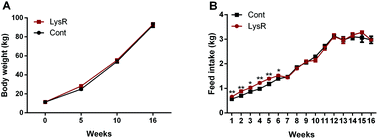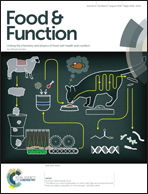Long-term effects of lysine concentration on growth performance, intestinal microbiome, and metabolic profiles in a pig model
Abstract
Lysine is a common limiting amino acid in human and animal diets and plays an important role in cell proliferation and metabolism. Our previous study suggested that short-term lysine restriction improved feed intake. Herein, we further investigated the long-term effects of lysine restriction on intestinal microbial communities and metabolic profiles in pigs by 16S rDNA sequencing and metabolomic analysis. The results showed that 30% lysine limitation increased the feed intake in piglets but not in growing and finishing pigs. Microbiota sequencing was conducted, and we identified 12 differentiated microbes at the genus level in response to dietary lysine restriction. Metagenomic predictions by PICRUSt suggested that the altered microbiota was mainly involved in the host metabolism, especially in amino acid metabolism. Intestinal metabolomic study identified 20 differentiated metabolites in finishing pigs, which were mapped into 5 metabolic pathways including glutamine and glutamate metabolism, taurine metabolism, alanine, aspartate and glutamate metabolism, vitamin B6 metabolism, and pentose and glucoronate metabolism. Determination of serum amino acids and intestinal amino acid transporters further validated the results obtained from PICRUSt and metabolomic analyses, which showed that long-term lysine restriction influenced amino acid metabolism. Phosphorylation of mTOR in the intestine was not altered in lysine-restricted pigs, whereas lysine limitation markedly inhibited the AMPK signaling. In conclusion, long-term lysine restriction from piglets to finishing pigs affected the amino acid metabolism, which might be associated with gut microbiota and AMPK signaling.



 Please wait while we load your content...
Please wait while we load your content...